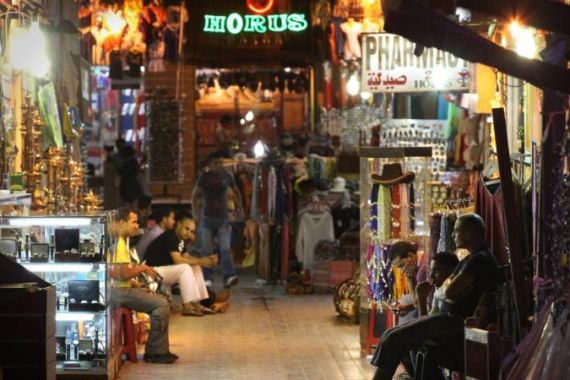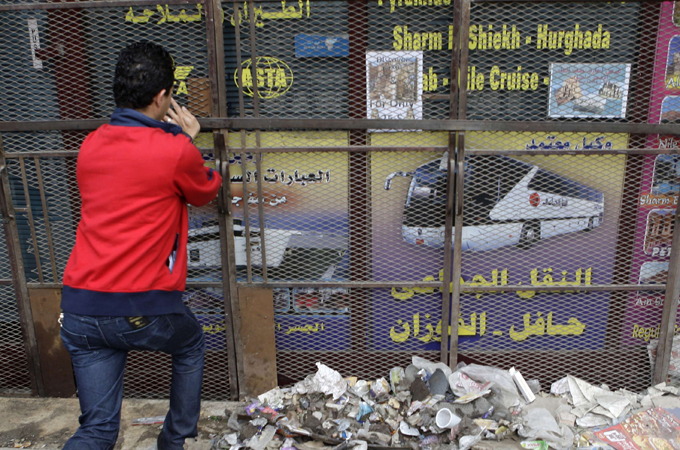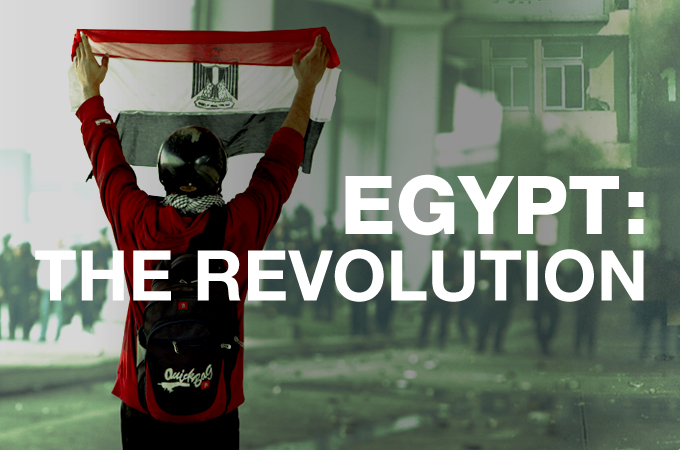Egypt declines major bailout loans
Despite suffering major economic blows during its recent uprising, Cairo says it will not borrow.

 |
| Egypt’s tourism industry, a vital engine of the economy, suffered a major blow in the recent uprising [Reuters] |
Egypt will not borrow from the World Bank and International Monetary Fund after revising its budget and cutting the forecast deficit, even though a loan had been agreed.
Finance Minister Samir Radwan, Egypt’s finance minister, said on Saturday that although the 2011/12 deficit in the first draft budget was forecast at 11 per cent of gross domestic product, it was revised to 8.6 per cent because of a national dialogue and the ruling army council’s concerns about debt levels.
Keep reading
list of 4 itemsA good, steady job? India election turns spotlight on a dream gone sour
Photos: Iran’s unravelling carpet sales
Biden labels Japan and India ‘xenophobic’ along with China and Russia
“So we do not need to go at this stage to the Bank and the Fund,” Radwan told Reuters news agency.
Despite the budget revisions, the government said it still expected growth of 3-3.5 per cent, in line with previous forecasts, which some economists said could prove optimistic.
Egypt this month agreed on a $3bn, 12-month standby loan facility from the IMF, which Cairo had said came with more lenient terms than usually associated with such lending.
An IMF spokesman confirmed on Saturday that Egypt has scrapped plans for the loan programme.
“In light of these changes, the authorities see no immediate need for a financial arrangement from the IMF,” the spokesman said, adding, “The IMF continues to maintain a close policy dialogue with the authorities.”
The IMF and World Bank had been among a range of foreign countries and bodies to offer funds to Egypt to help cover a big budget shortfall after the economy was plunged into turmoil by the mass protests that drove Mubarak from office on February 11.
Qatar ‘gift’
No doubt helping Egypt’s budget are offers of support from Gulf states. Radwan said Qatar had provided $500m for budgetary support in the past week.
“That is a gift,” he said, when asked if there were any conditions attached to the Qatari cash.
He said Saudi Arabia had earlier offered a similar amount. The minister said the first draft of the budget, which forecast a deficit of about 170 billion Egyptian pounds, was discussed with activists, writers, the business community, trade unions and non-governmental organisations.
Radwan said the budget had been reduced in part by raising income tax from a 20 per cent flat rate to 25 per cent on firms and individuals earning more than $1.6m. Profits above that figure would be taxed in the new band.
 |
| See our complete coverage of Egypt’s uprising. |
“I consulted with the business community, and they said they are willing to pay that. That is why I didn’t raise it to more than 25 per cent, because beyond that we would be back to where we were before (several years ago) when income tax was 40 per cent and there was very little tax collection,” he said.
Cigarette tax would rise to 50 percent from 40 per cent, but food subsidies would not be changed.
Egypt’s subsidy bill had been running at about $23bn with about $16bn of that spent on fuel subsidies, he said without specifying the period.
However, the news is largely seen as a positive step for Egypt, where protesters rallied against Mubarak demanding political freedoms and an end to what they saw as a system of rule from which a rich elite benefited at the expense of the poor.
“As a result of this dialogue and given the concern of the military council not to have huge debts for the government that comes after the election, the deficit was reduced to 134 billion (Egyptian) pounds ($22.5 bn), equivalent to 8.6 per cent of GDP,” Radwan said.
“The result is, we didn’t need outside finance. We are covering the largest part from local sources and we are waiting for outside support to come in,” he said.
“If we had gone with the other package, we would have needed to go (to the IMF),” the minister said, adding the new budget would not go back on a commitment to social justice.
On the budget plans, Radwan said: “The programme is our programme, so there is no conditionality (from others). It is just a changed programme.”
Asked about whether Egypt might return to the international markets with a new Eurobond, he said: “I don’t rule out anything. Once the budget is approved, finalised, then I start looking about the details about the financing.”